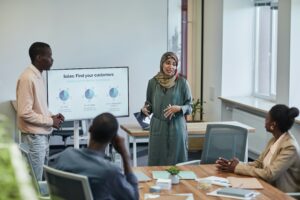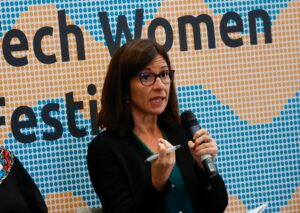
In the Middle East and North Africa (MENA) region, women who open a business undertake a gruelling path. Female entrepreneurs face some of the highest levels of discrimination in accessing capital or productive resources: 45%, compared to the world average of 27%. In an area with one of the highest unemployment levels, over half of the female workforce is hired informally, and women tend to spend six times more on domestic work and unpaid care.
If already worldwide, girls and women are the most impacted by economic downturns. In this region, they are also threatened by disasters related to climate change, economic instabilities and a lack of infrastructure. Yet, young women are achieving higher levels of education and pursuing a path toward emancipation.
Anna Dorangricchia, Programme Manager of Gender equality with the Union for the Mediterranean (UfM), knows the challenges for the region well. And she sheds some light on the situation for women entrepreneurs in the area.
What is the situation for women entrepreneurs in MENA?
 One of the greatest differences often used to compare female entrepreneurs in Europe and the MENA region is why women open businesses. It is common to believe it is out of choice in the first case and out of necessity in the second. The reality is more nuanced.
One of the greatest differences often used to compare female entrepreneurs in Europe and the MENA region is why women open businesses. It is common to believe it is out of choice in the first case and out of necessity in the second. The reality is more nuanced.
For sure, in the Middle East and North Africa, women recently became entrepreneurs out of need (in the region, the gender gap in the labour market is still vast, and women in the workforce account for around 25%). Yet, many have done so to impact their communities. Undeniably, if the situation has been changing, big challenges remain, especially regarding financial support and access to capital.
For decades, in the area, the only accessible form of funding has been micro-credit, which, with 30% interest rates, has become a form of exploitation. Access to other forms of financing, i.e. venture capital or investments from business angels, is arduous.
Do technology and innovation play a role in the development of their enterprises?
There is an increased interest in the region for technology and innovation. For example, in Tunisia, 55% of engineers are women. At the same time, financial institutions consider the area a hot spot for climate change, food security and energy crisis. Still, data are not entirely encouraging when discussing industrial development or revolution 4.0.
One thing is to have internet access and use Instagram or Facebook as marketing tools. It is another to use smart tools in the industrial revolution 4.0. Data from UNIDO between 2019 and 2020 clearly show that 85% of women use the internet for commercial (or marketing) activities. Still, only 23% of female entrepreneurs exploit its potential in the industrial and manufacturing sectors. 65% affirm they need training in this sense.
If positive developments exist, what is helping them?
Thanks – if “thanks” is the right word – to Covid, the attention to the role of women in society has increased. And in the last 2 or 3 years, the debate has exploded about gender equality as a matter of equal human rights but also of economic development, missed opportunities, and lack of GDP development. If we do not invest in women, their inclusion, and female (human) capital in their businesses, we lose money.
Many actors, financial institutions included, are putting effort into analyzing or reducing conscious and unconscious biases, for example, in evaluating women-led businesses. But change happens because there is a public debate, because of training, and for capacity building on both sides. In the region, women do not speak the financial language of banks and investment funds. So they need training. At the same time, those working in financial institutions have never been trained to understand the needs of women entrepreneurs.
We need to make different actors talk to each other. Programs, initiatives, and platforms have been created to bridge the gaps. For example, as UfM, we launched a networking platform for 140 women entrepreneurs; with UNIDO, we will establish a pilot incubation program for women-funded startups in Lebanon (IDEA App) and a digital platform for women who work in tech. Those are pilot projects and specific initiatives, but we want them to become best practices to be replicated on a regional level.
How local governments and institutions are responding? And how do biases limit women’s independence?
 A change is happening – also in political and public debates. On a legislative level, all the countries in the region have lifted formal restrictions for women on everything concerning economic rights – like opening a bank account or a business. In practice, cultural stereotypes – though not applicable only to these countries! – about female entrepreneurs still stand. Women are considered less reliable in economic performance, generally more emotional and weighted down by a double burden if they are mothers. They have less network, and then, it is believed, less possibility of commercial expansion.
A change is happening – also in political and public debates. On a legislative level, all the countries in the region have lifted formal restrictions for women on everything concerning economic rights – like opening a bank account or a business. In practice, cultural stereotypes – though not applicable only to these countries! – about female entrepreneurs still stand. Women are considered less reliable in economic performance, generally more emotional and weighted down by a double burden if they are mothers. They have less network, and then, it is believed, less possibility of commercial expansion.
Moreover, they often suffer from impostor syndrome and believe they are not good at pitching their projects. Then, they do not even try. It is a complex situation, comprised not only of women’s perspectives but also of objective limits, structural and legislative. Just consider the different struggles regarding logistics for an industrial enterprise in a rural or an urban area. Or the impact of the crisis we have been experiencing – in terms of provisions, inflation and devaluation.
It is a region with a big potential to become a bridge between Europe and Africa. But at the same time, it is blocked between Europe and Africa.
Considering a gender perspective, do you see a generational shift?
In terms of levels of education – young women between 18 and 24 are at least double than those of the previous generation. Access to education has played a central role; it has been crucial in this sense. Many young women study or have working experiences abroad. They want to go back to their countries to develop their enterprises. They have an advanced linguistic level, and for the most part, they are anglophone. [They are young, prepared and willing] But do not have job opportunities. Then economic migrations happen.
Countries like Lebanon or Tunisia are emptying out of young women, often with degrees or entrepreneurs, because the environments do not allow them to grow. Some good and advanced innovation centres exist, but their struggle to continue is real.
Where to go from here?
Challenges are also opportunities, I believe. The human capital is there, especially regarding the quality of education. There is potential. Moreover, the effects of role models have been important drivers. There are many mentorship and leadership programs, and they are integral to cultural change. Of course, if you talk to women entrepreneurs working in the field, they say: more than training, we need capital! But, actually, these two things go together.
 Even if they are few, some success stories are making women aware of the need for networks, and not just made of women. In fact, the outlooks are good if men are actively and positively involved and back up the process. They must understand that we are not taking away power but balancing an unfair situation.
Even if they are few, some success stories are making women aware of the need for networks, and not just made of women. In fact, the outlooks are good if men are actively and positively involved and back up the process. They must understand that we are not taking away power but balancing an unfair situation.
Regarding concrete actions: the different actors involved shall work together, starting from schools and providing entrepreneurship courses not as one available option but integral to curriculums, creating bridges between vocational training and the labour market. Facilitating the dialogue among all actors and women – those involved in civil society, entrepreneurs and the economic system.
Nobody expects to change the world with one training course. But even the smallest of steps can build up this underdeveloped ecosystem. And we need cooperation driven by capital because if we talk, but no public and private investments follow, we are stuck. And, in the end, people leave.
***
Alley Oop’s newsletter
Every Friday morning Alley Oop arrives in your inbox with news and stories. To sign up, click here.
If you want to write to or contact Alley Oop’s editorial team, you can email us at alleyoop@ilsole24ore.com.